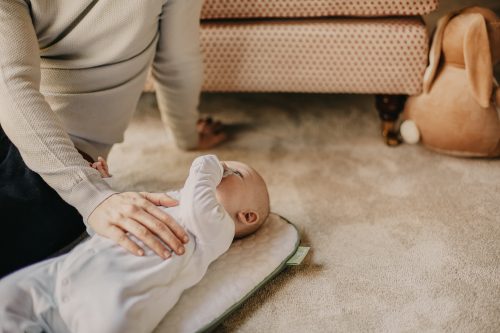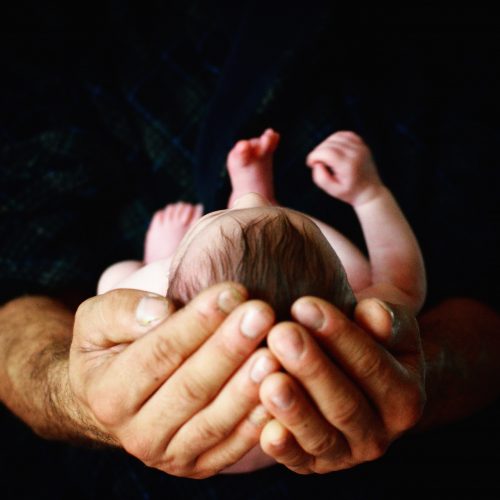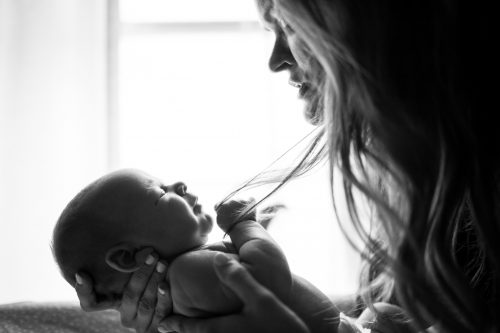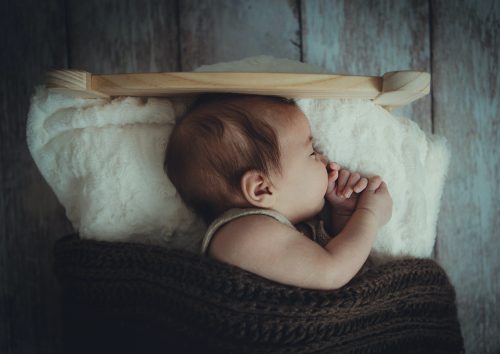Have you noticed that your baby won’t sleep unless held? Although it may be taxing, it isn’t abnormal behavior for infants. So why is it that babies desire to be held so often? We’ll have the answers you need in today’s post.
Why does my baby want to be held to sleep?
Baby only sleeps when held
Does your baby only sleep when held? This isn’t abnormal behavior for infants. In fact, it should be expected.
Babies, and especially newborns, aren’t used to the world around them. They are used to being cradled in your womb virtually free of most of the external sounds that likely sound jarring to them now that they’ve entered the new world. And things that look, smell, feel and sound ordinary to you may be overwhelming for your little one.
Because of this, it makes perfect sense that your infant, only when safe in your arms, feels comforted and relaxed enough to fall soundly asleep.
Baby always wants to be held
In addition to wanting to be held to sleep, you may also notice that your baby wants to be held all the time.
Rather than get frustrated over this reality, it is important to bear in mind that your little one feels most at ease when with you.
Remember that your baby spent the first nine months in perfect solitude within your womb before being pushed out into the world. Thus, your baby will feel most at ease when next to you, rather than on the floor or in their crib.

When your baby won’t go to sleep
Sometimes, you may find that your baby won’t go to sleep unless they are held in your arms. As frustrating as this might be, there are ways around this.
You may wish to try the rock and lower method which involves rocking your baby to sleep in your arms and then lowering your baby into his or her crib once he or she is fast asleep.
Be careful when doing this though. You won’t want to lower your baby into his or her crib until at least 20 minutes after they’ve fallen asleep in order to ensure your baby doesn’t startle and wake back up when you attempt to put them down.
My baby cries when I put him down
We’ve all been there. You try to put your infant into the crib and he or she immediately wails.
What do you do?
First, assess the situation. Is your baby hungry or in need of a clean diaper? If so, take care of these needs first. Also ensure that your baby isn’t hurt or uncomfortable in any way.
Remember that babies use crying as their primary means of communication, so knowing what your baby is trying to communicate is vital.
Once you’re sure you’ve taken care of your baby’s primary needs, it is time to step away. Assuming that your baby has all of his or her needs met, it is perfectly okay to lay your baby down for some time to get a few things done.
You will, however, want to make sure that your baby is within your line of vision and is placed in a safe spot. This way your baby can see you as you go about your daily tasks and you can see them, too.
Another idea? Strap your baby to you. Using a baby carrier can be ideal for little ones because keep your baby close while freeing up your hands. Just be sure not to take on dangerous activities, such as frying in hot oil, when wearing your infant.
How do I get my baby to sleep without being held?
For newborns
Newborn won’t sleep at night unless held
Why won’t my newborn sleep unless held?
The reason that a newborn won’t sleep unless held isn’t really a mystery. They want to be near you and are likely seeking comfort.
Still, a newborn that won’t sleep unless held may eventually need to be put down. He or she will actually need to be taught to sleep which will happen with time.
We don’t recommend you hold your baby all night as doing so puts them at risk for injury once you fall asleep.
Newborn won’t sleep in crib
If you find that your baby won’t sleep in his or her crib, try this.
First, ensure that all of your baby’s naps are no longer than 2 hours at a time.
Then, wait until about ten or eleven o’clock at night to put your baby to bed. If he or she cries, wait it out while remaining in the room with him or her.
Eventually, your baby should fall asleep. If not, check his or her diaper and ensure that they aren’t hungry or sick before trying the method again.
Stay consistent with this routine and you may see progress within a week or two. Eventually, your baby will learn to sleep in his or her crib on their own.
Newborn won’t settle at night
If you find that your newborn won’t settle at night, you may need to assess his or her environment as well as your baby’s overall schedule.
As counter-intuitive as it is, babies that are too tired actually have more difficulty getting to sleep at night than those who rested well during the day.
This is often referred to as a baby being “over-tired”.
To curb this, do some research on “wake-windows” which is the maximum amount of time your baby should be awake.
Adhere strictly to those guidelines.
Once your baby’s wake window is complete, you’ll want to put him or her down in a safe, quiet and dark space for rest. Assuming that your baby does go to sleep at these times, you’ll likely notice that your baby settles easier at night.
Again, make sure that none of your baby’s naps goes past 2 hours. Otherwise, your baby may get too much rest and will be overactive at night.
Newborn will only sleep on me
If you find that your newborn will only sleep on you, stay consistent with your nightly routine, but consider allowing your baby to nap during baby-wearing. Simply strap your baby on as you continue on with your day.
Once your baby is old enough, you may consider sleep training your baby so that he or she begins to sleep independently. The prime age to begin doing this is generally around 4 months old.
See your pediatrician with specific questions related to baby sleep.
Newborn won’t sleep on back
If you find that your newborn isn’t sleeping on his or her back, you must keep trying. Resist the urge to buy positioners and wedges to help your baby stay on their back as these pose suffocation risks. Read more about this topic on our blog: Baby Keeps Sleeping Face Down.
Instead, we recommend placing your baby on his or her back at all times, and flipping your baby back over to his or her back if he or she manages to flip over until your baby is at least 6 months of age and can flip over on their own.

3 day old baby will only sleep on me
When your baby is as young as 3 days, you’ll have to accept that your little one wants to be close to you as he or she gets used to the world around them.
And while it will be necessary to put a baby at this age down eventually, it is also a good idea to wear your baby during the day in a baby wrap or carrier to give your brand new baby the security of being close to you when it isn’t nighttime.
2 week old doesn’t want to be put down
Sometimes, you’ll need to put your 2 week old down to get housework done or to shower. If you must put the baby down and he or she begins to protest, it is fine to put the baby down anyway in his or her crib until the task you need to achieve is complete.
When you do this, always make sure that your baby’s environment is safe. The crib is often the safest palace for them to be as long as it is free of loose blankets, pillows, toys and other objects.
You’ll also want to make sure all primary needs are met, such as diaper changing and feedings, before you place your baby down for a few minutes at a time in his or her crib.
3 week old baby won’t sleep unless held
A 3 week old baby is still very fresh out of the womb and will need extra comfort. Remember that formal sleep training isn’t really recommended until four months of age. Although some babies are found to be sleeping through the night by six weeks.
Either way, a three week old baby is likely to still want to be held in your arms. Eventually, you will need to put him or her down. Consider some of the methods mentioned previously and later on in this post to help lull your baby to sleep.
How to get newborn to sleep
Getting a newborn to sleep can be difficult, but it can be done.
We recommend watching for your baby’s wake windows as well as sleepy cues such as yawning or rubbing the eyes. Don’t wait until your baby gets cranky to put them down because, at that point, it may already be too late. An overtired baby is harder to settle than a well-rested one.
How to get newborn to sleep without being held
Getting a newborn to sleep without being held isn’t easy. But there are ways you can manage it. If you find that you are struggling in this area, check out a few of these baby sleeping tips to help get your little one settled at night:
- Snuggle During the Day: Remember that your baby most likely wants to be held to sleep because that is how he or she feels most comfortable. Because of this, it is important that you make sure you get plenty of snuggle time in to reassure your baby during the day. Hold, kiss and wear your baby daily to ensure that he or she feels secure and comforted.
- Pay Attention to Your Schedule: As previously mentioned, you’ll want to do your research on how long your baby should stay awake for his or her age range and aim to put your baby to bed around that time. Remember never to allow your baby to sleep past 2 hours if it isn’t nighttime or else you may miss out on that 3-4 hour sleep stretch that most newborns do only once a day. You want to make sure that stretch happens at night!
- Try the 5 S’s: The 5 S’s is a strategy coined by Dr. Harvey Karp to put your baby to sleep. They include swaddling, placing baby on his or her side, shushing, swinging and sucking. Many parents have found this to be an effective routine for putting their little one to sleep.
- Set the Mood Right: Make sure that your baby’s sleep environment is free of distractions. Ensure you aren’t exposing your little one to bright lights and toys up to an hour before bed. Also, be sure that your baby is satiated, i.e. not hungry, and that he or she has a clean diaper. You’ll also want to make sure that when your baby does wake up in the middle of the night, you aren’t stimulating them. We highly recommend you avoid playing with them, cooing at them, turning on lights and any other stimulating activities that might keep your baby up. You should be feeding your baby, diapering your baby, then putting your baby straight down for sleep.
- Hang in There: As much as we hate to say it, the newborn phase isn’t for the faint of heart. Until your child reaches 3-4 months of age, you may find it difficult to get your baby on a good sleeping routine. Until then, do your best to stay patient, enlist help and get plenty of rest on your own when able. Take care of yourself and don’t be afraid to ask for assistance when you need it.
Getting newborn to sleep at night
In order to get your newborn to sleep at night, you’ll want to make sure you aren’t allowing them to sleep more than 2 hours at a time during the day. This includes early morning naps.
If you do, you’ll forfeit the 3-4 hours stretch of sleep that most newborns have. You want to save that long stretch of time for the evening so you can get the rest you need, too.

Tips to get newborn to sleep
Remember that newborns are new to the world. Just as it takes time to learn to walk and talk, it also takes time for these little humans to learn how to sleep. Go easy on yourself and your baby.
For more tips on how to get your newborn to sleep, see the detailed section above.
Months old
Baby won’t sleep unless held 3 months
At this age, your baby may still want to be held, and that is okay. Most infants love to be in the arms of their parents and caregivers. Reference the tips above for how best to get your little one settled and ready for bed beyond your embrace.
Baby won’t sleep unless held 4 months
Even at 4 months, separation from a parent can be difficult.
Be patient.
Having said that, this is a great time to start sleep training as your baby’s circadian rhythm has been established. Just remember to be gentle with your baby and always attend to your baby when he or she really needs you.
6 month old baby won’t sleep unless held
Six months is another great time to start sleep training your baby if you haven’t already. It is also a good time to start giving your baby a bit more independence.
At this age, it may be good to unwrap your baby from his or her beloved carrier and let them explore a bit more often. This will help them get accustomed to being apart from you. It may also help them sleep independently at night.
7 month old baby wont sleep unless held
Now that your baby is getting older, they will likely be able to respond to sleep training. Talk to your pediatrician about specific concerns you may have about your child’s sleep schedule.
9 month old wont sleep
By 9 months, your baby may be sleeping on his or her own, but that doesn’t mean he or she won’t wake in the middle of the night. Be careful not to over-stimulate your baby when they wake but also don’t ignore them. Make sure you have taken care of their needs before stepping back out and wishing them a good night.
Toddler
Toddler sleeps on top of me
It’s perfectly okay if your toddler sleeps on top of you for daytime naps, but never make nighttime sleep in this position a habit.
This goes for any age.
If you need help breaking negative sleep patterns in your toddler, talk to your pediatrician or seek help from a sleep professional that specializes in young children.

Naptime
How to get baby to nap without being held
Getting your baby to nap without being held is much like getting your baby to sleep without being held. Thankfully, there are gadgets you can use, such as swings and gliders, that can enable this to happen much quicker.
What do you do when your baby only sleeps in your arms?
If your baby only sleeps in your arms you’ll have to eventually break him or her from this habit. Remember that allowing your baby to sleep in your arms during the night is dangerous for your baby. Try the aforementioned tips to get your baby to sleep apart from you.
When should baby fall asleep alone?
Your baby should ideally be in his or her separate crib or bassinet from birth.
For questions about co-sleeping with your baby, you should talk to a pediatrician.
Tips to help baby sleep on bed or crib
Baby won’t sleep in crib
Your baby will eventually adjust to being in his or her crib with time. But in order for this to occur, he or she will have to be put in the crib.
Resist the urge to have your baby lie with you all the time. Place your baby in the crib more often so that he or she gets more accustomed to being there.
Baby won’t sleep unless next to me
Again, your baby will become accustomed to whatever you expose them to. Give your baby ample opportunities to adjust to the crib. Try to avoid immediately picking your baby up at the slightest whimper.
Baby wakes up every time I put her down
If your baby wakes up every time you put him or her down, you may need to wait longer before attempting to lower them.
Ideally, you’ll want to wait 20 minutes after your baby appears to have fallen asleep. This will ensure that they are in a deep slumber. At this point, you may have an easier time lowering him or her without disrupting their sleep.
Baby won’t sleep unless skin to skin
Give your baby time apart from you. Give them a chance to adjust to their crib, even when it isn’t time to sleep.
This way your baby will grow accustomed to his or her crib in situations that aren’t related to you leaving them.

Baby Won’t Sleep Unless Held: A Common But Fixable Problem
To close, getting an infant to sleep isn’t an easy job, but somebody’s got to do it. By following the aforementioned tips and tricks, we’re positive you’ll have an easier time getting your baby down during rest times.
Lynn
Lynn is a freelance writer, a wife, and a mother of two beautiful kids. Lynn started Infant Empire with the aim of making parenting easier for fellow mums and dads. She believes the parenting tips provided here will be of great help to all parents.Recommended Reading
3 Year Old Sleep Regression: Toddler Sleep Pattern Changes
A 3-year-old's sleep regression is a real struggle. Join us as we explore the many aspects of sleep regressions for 3-year-olds.
Baby Keeps Sleeping Face Down: What Should I Do?
Should you do something when your baby keeps sleeping face down? When is it okay for a baby to do so? These and more questions, answered here.
Mini Crib vs Crib: Which Is the Best Pick For Your Baby?
When it comes to a mini crib vs crib, you must inform yourself of the difference between the two in order to make the right purchase.
When should you transition from swaddle to sleep sack or sleeping bag?
in this article, we shall look at some of the things to look out for in order to determine when to transition from swaddle to sleep sack or sleeping bag.
Crib Alternatives: When a Crib Isn’t Your First Choice
Curious about what baby sleeping options apart from the crib are out there? Let's explore various crib alternatives for your little one.
Toddler Bedroom Essentials: Transitioning Your Toddler to a “Big Kid” Room
We'll help you prepare to transition your toddler from their nursery to their own “big kid” room. Check out these toddler bedroom essentials!


Leave a Reply